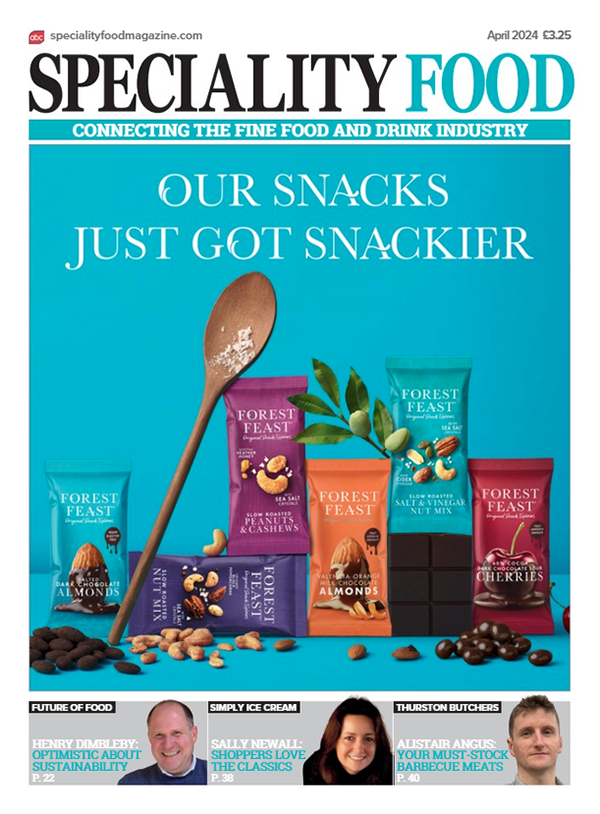“The science of combining food and wine”

- How one cheese shop supported locals in lockdown
- Rory Mellis, IJ Mellis: “Local businesses have a chance to flourish”
- Why we should be proud of the cheese industry’s response to Covid
- The joy of cheese grading
- “Keeping the faith”
I was recently invited to be part of a panel to talk about the science behind matching cheese with wine – first the wine expert talked about the wine and a how each was made, then I talked about the cheeses and how they were made with emphasis on moisture content, fermentation and moulds. Next, we did the combinations and our biochemist talked about the science behind the matches
Over the last 30 or so years I have done hundreds of masterclasses on matching cheese with champagne, sweet wines, wine, beer, cider, whisky and even tea, and have been amazed what does and doesn’t work and always curious why some very similar wine combinations do and some really, really don’t work. I have also been extremely irritated by the stubborn determination of some wine experts to ignore any suggestion I put forward for possible matches, and instead stubbornly stick to the belief held by most English people that cheese can be bunched together into just three types: hard, blue and soft, and so perpetuate the myth that red wine is better than white with cheese and, worse, that sweet wines go with blues – a generalisation based on the assumption that all blues have similar strengths of flavour, levels of acidity, sharpness and salt levels.
An attempt to point out that in Britain alone we make over 80 different blues is met with a tight lipped explanation as to how the variation in wine from one vine to the next is far more significant. At this point I have to assume they are likely to belong to the camp that believes all goats cheeses taste the same and will therefore be perfect with a Sauvignon Blanc. Ha! They do not and, in fact, some combinations are reminiscent of Three Billy Goats Gruff or my dog’s breath! Surprisingly, many a rosé, my favourite summer tipple, has proved a good partner!
Despite Britain alone now making over 750 cheeses, most people – including many retailers – fail to understand that any cheese that can be made with cows’ milk can be made with goat, ewe or even camels’ milk – yes, there is a Camelbert! The myth that all goats cheese goes with Sauvignon Blanc comes from the classic combination of Sauvignon Blanc with Chevre. But ‘chevre’ in this case doesn’t mean any cheese made with goats’ milk, in fact it refers to a very specific style of cheese found mainly in the Loire – a small, misshapen, mould encrusted cheese with a very pronounced nutty taste and goaty tang.
And don’t waste your favourite vintage port with a Stilton – the assumption that Stilton and port is a marriage made in heaven is based on the assumption that all ports tastes the same which they definitely do not. In fact, a tawny port is lovely with a ripe Stilton but horrid with a young Stilton, which would much prefer a dry Riesling.
So what I and the audience were really hoping for were some excellent combinations, as well as answers to the question “why do some combinations work and others don’t? Why did the Mozzarella di Bufala paired with bubbly taste like the smell of BO, or the Capricorn Goat (a Camembert-style cheese) with the lovely Wrexham Bacchus White taste like salty, acidic milk with a soapy finish?”
We had a great time tasting, some great questions from the audience and a lot of laughs about what didn’t work, but I will have to do it again next year to find the answer. Meanwhile, I shall dedicate a few more hours to drinking some excellent wines with some of my favourite cheeses, discovering great combinations and avoiding the really bad ones – asparagus and the Gamay grape is a total no no. Pinot Noir and Merlot with their softer tannins work better with more cheeses than Cabernet Sauvignon, and Shiraz is too big and boisterous for all but the hardest cheeses.
What I would love is for you to send me in combinations of cheeses with specific wines, beers and ciders that work and I will summarise and publish the results in Speciality Food later in the year. Then you can all send them off to the wine experts in your life and share them with your friends and colleagues! Maybe then we can get them to think of cheese as being as complex and diversity as their precious wine – I find my favourite line: “unlike wine, cheese has a vintage everyday!” works well when trying to convert a non-believer!
more from Cheese Talk
-
“Don’t sway to populists”
25 August 2016 Cheese TalkWith consumer demands continually fluctuating and markets changing on a yearly basis, it’s almost impossible to predict what the new craze or sudden ‘loser’ will be. -
“Making a spectacle of yourself”
12 July 2016 Cheese TalkUntil a few weeks ago I was feeling rather smug about my moved to New Zealand, basking in a four month-long near-drought with autumn temperatures rarely falling below 20ºC -
“Cheese magic – it’s in our culture”
17 May 2016 Cheese TalkWe all know that cheese is magic… really. Some milk, some rennet, some starter culture, some salt and maybe sometimes some controlled mould, and hey presto you have thousands of different cheeses





